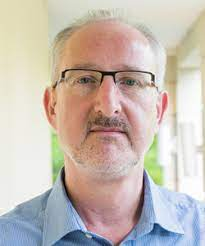
Jonathan Chaplin was the first Director of the Kirby Laing Institute for Christian Ethics, holding the position from 2006 – 2017. He is Member of the Divinity Faculty of Cambridge University, and was Visiting Lecturer at the VU University, Amsterdam from 2007-2011. He is a specialist in Christian political thought, and has authored or edited nine books and reports, and many articles, in this field. From 1999-2006 he served as Associate Professor of Political Theory at the Institute for Christian Studies, Toronto, holding the Dooyeweerd Chair in Social and Political Philosophy from 2004-6. He is a member of the Advisory Council of the Cambridge Institute on Religion and International Studies (CIRIS) based at Clare College, Senior Fellow of the think-tank Cardus in Hamilton, Ontario, writing regularly for Cardus’s online journal, Comment. He is a consultant researcher for the UK think-tank Theos and has written for Guardian CiF.
He is married to Dr. Adrienne Dengerink Chaplin, a specialist in Christian aesthetics, and they have two children, Paul, who works for CAFOD, and Lucia, a medical student at Nottingham University and active in SPEAK. He attends St Andrew’s Anglican Church, Oakington, Cambridgeshire where he occasionally preaches and cuts the grass.
His academia website is available here.
On-line articles
• ‘British superiority and insularity exposed by the cold reality of Brexit’, Reimagining Europe, 2 February 2017.
• ‘The Global Greening of Religion‘, Palgrave Communications Comment 2 art. no 19047 (July 2016).
• Responses to two chapters of Lambert Zuidervaart, Religion, Truth and Social Transformation: Essays in Reformational Philosophy (McGill-Queens, 2016), in Groundmotive Blog Symposium, here and here.
• ‘Is there faith in British identity?’ The UK in a Changing Europe, King’s College London, 5 May 2016.
• ‘Why we need a proper debate on the EU‘, lecture given at the Keeping Faith in the EU? Conference, University of Winchester, 9 April 2016.
• ‘Laudato Si’: Structural Causes of the Ecological Crisis’, Comment 24 September and 1 October 2015.
• ‘My kind of “Christian nation”‘, Theos blog (May 2014).
• ‘”The Full Weight of Our Convictions”: The Point of Kuyperian Pluralism’, Comment (November 2013).
• ‘The role of “faith” in multicultural integration’, in Public Spirit (University of Bristol, September 2013).
• ‘Marriage Bill signals need for divorce‘, Church Times 26 July 2013.
• ‘The Church of England and the Funeral of Baroness Thatcher‘, Fulcrum (April 2013).
• ‘Can Forgiveness Mute Justice?’ (review of Nicholas Wolterstorff, Justice in Love), Comment (March 2013).
Books
2016. Co-editor with Gary Wilton, God and the EU: Faith in the European Project. Routledge.
2013. Co-editor with Colin Bell and Robert White, Living Lightly, Living Faithfully: Religious faiths and the future of sustainability. Faraday Institute/KLICE.
2011. Herman Dooyeweerd: Christian Philosopher of State and Civil Society. University of Notre Dame Press.
2011. Multiculturalism: A Christian Retrieval. Theos.
2009. Editor, with Robert Joustra, God and Global Order: The Power of Religion in American Foreign Policy (Baylor University Press, 2010).
2009. Co-editor with Nick Spencer, God and Government. SPCK.
2009. Talking God: The Legitimacy of Religious Public Reasoning. Theos.
2002. Co-editor with Craig Bartholomew, Al Wolters, & Robert Song, A Royal Priesthood: Using the Bible Ethically and Politically. A Dialogue with Oliver O’Donovan. Paternoster/Zondervan. Vol. 3 of ‘Scripture and Hermeneutics Seminar’ series.
1994. Co-editor with Paul Marshall, Political Theory and Christian Vision: Essays in Memory of Bernard Zylstra. University Press of America.
1992. Editor, Politics and the Parties (When Christians Disagree). Intervarsity Press.
Herman Dooyeweerd: Christian Philosopher of State and Civil SocietyJonathan Chaplin
University of Notre Dame Press
Cloth Edition 2011464 pagesISBN 10: 0-268-02305-0ISBN 13: 978-0-268-02305-8
The twentieth-century Dutch philosopher Herman Dooyeweerd (1894–1977) left behind an impressive canon of philosophical works and has continued to influence a scholarly community in Europe and North America, which has extended, critiqued, and applied his thought in many academic fields. Jonathan Chaplin introduces Dooyeweerd for the first time to many English readers by critically expounding Dooyeweerd’s social and political thought and by exhibiting its pertinence to contemporary civil society debates.
Chaplin begins by contextualizing Dooyeweerd’s thought, first in relation to present-day debates and then in relation to the work of the Dutch philosopher Abraham Kuyper (1837–1920). Chaplin outlines the distinctive theory of historical and cultural development that serves as an essential backdrop to Dooyeweerd’s substantive social philosophy; examines Dooyeweerd’s notion of societal structural principles; and sets forth his complex classification of particular types of social structure and their various interrelationships. Chaplin provides a detailed examination of Dooyeweerd’s theory of the state, its definitive nature, and its proper role vis-à-vis other elements of society. Dooyeweerd’s contributions, Chaplin concludes, assist us in mapping the ways in which state and civil society should be related to achieve justice and the public good.